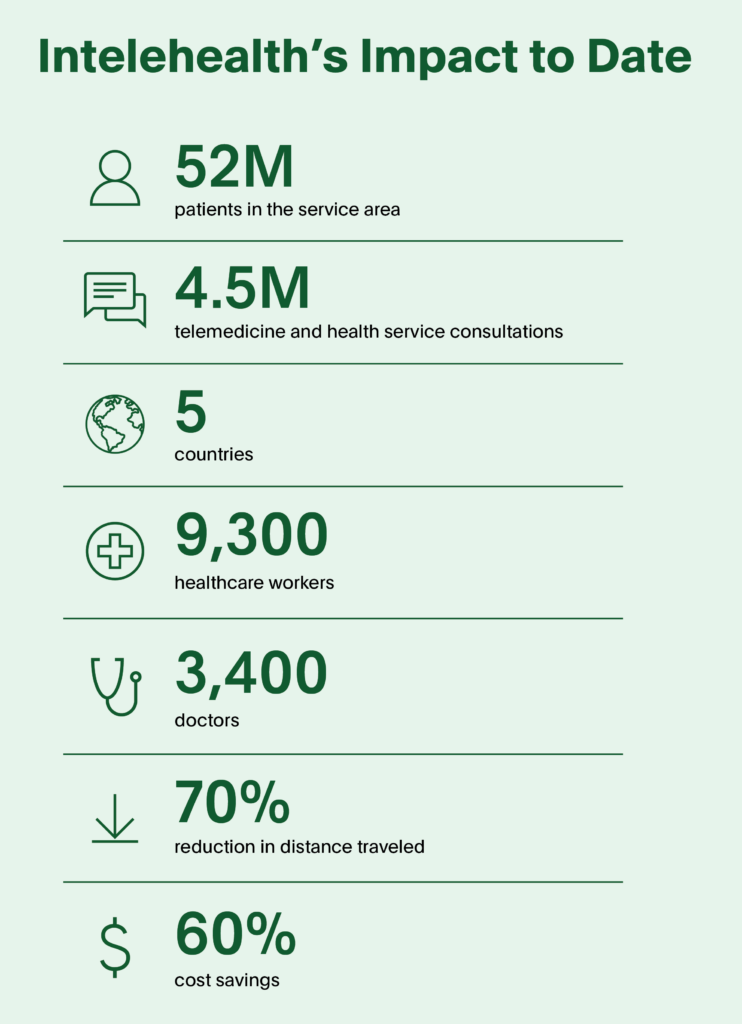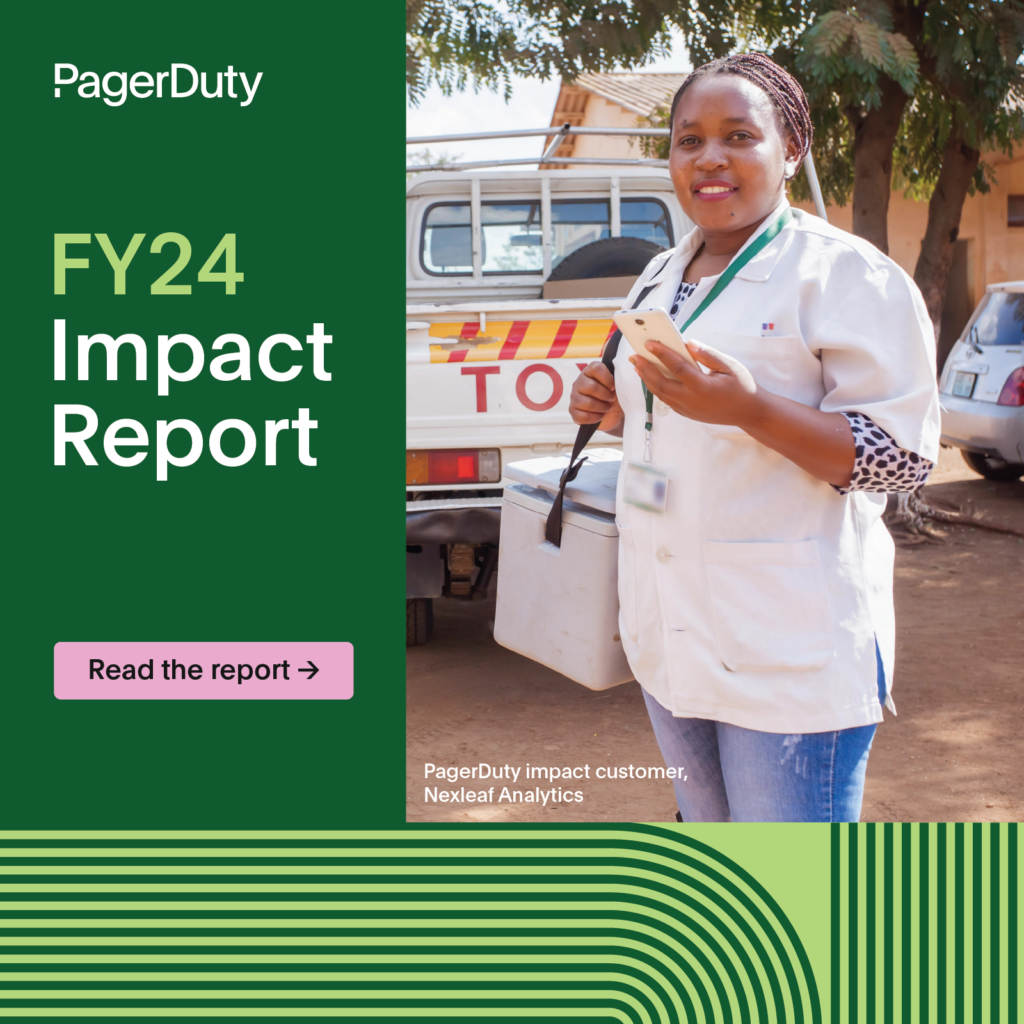- PagerDuty /
- Blog /
- Social Impact /
- Transforming Healthcare in Rural India with Telemedicine
Blog
Transforming Healthcare in Rural India with Telemedicine
PagerDuty Provides Key Support to Scale Intelehealth’s Impact
India’s healthcare landscape has seen remarkable advancements, with a growing emphasis on enhancing delivery and outcomes. While much attention has historically been on urban healthcare, the majority of India’s population resides in rural and rural-urban areas. Ensuring equitable access to quality healthcare in these regions is paramount. Despite persistent systemic challenges, particularly affecting women and marginalized communities, telemedicine has emerged as a transformative solution. Through teleconsultations, Intelehealth has facilitated an impressive 3 million consultations this year, marking a significant milestone in bridging healthcare gaps and extending vital services to underserved populations.
“Accessing healthcare can be a challenge for older individuals, especially if you are part of a low-income household that lives in a village 30 kilometers away from the closest district hospital. The governments are working on removing many hurdles, but several systemic challenges cannot be undone overnight.” – Intelehealth patient
To address the healthcare access challenge, many health systems are leveraging telemedicine, a pivotal innovation in global health. In 2016—four years before the COVID-19 pandemic highlighted telemedicine as a breakthrough solution—the India-based nonprofit Intelehealth, was already reaching underserved communities in this way in their mission to bridge healthcare disparities and ensure equitable access, which aligns with their mission of providing quality healthcare where there is no doctor. Over the past eight years, Intelehealth has implemented an ambitious strategy to expand provider to provider telemedicine, connecting frontline health workers to doctors, enabling patients to garner access to quality healthcare, telemedicine services regionally, resulting in 4.5 million teleconsultations conducted across three countries. so patients in underserved communities can access these doctors through the frontline health workers (nurses).
The team began working with low- and middle-income communities in India, Syria and Kyrgyzstan and quickly recognized the power of partnership with governments and NGOs to offer subsidized services to patients living in conditions of poverty. By harnessing these partnerships, Intelehealth provides telemedicine software, implementation support and knowledge to government health facilities and nonprofits, and equips frontline health workers with a web and app-based solution to address patient needs, consult specialists, and efficiently coordinate medication requests with local pharmacies.
The virtual platform connects patients with healthcare professionals via audio or video calls, and even uses artificial intelligence (AI) to document their symptoms for treatment guidance. In certain areas, however, poor cellular connectivity requires health workers to go to great lengths to serve rural communities.
Intelehealth’s DevOps Tech Lead, Satyadeep Kumar, recounts a striking example, saying, “Cellular connectivity is so bad that the health workers had to walk eight miles to get a signal. In the morning, when they start for the village, they reach the top of a mountain to get the data uploaded, and then, in the evening they again climb the mountain to upload the data back into the service. Hats off to the health workers, that none of these hindrances have ever deterred them.”

This solution has especially benefited women, who comprise 60% of Intelehealth patients. Telemedicine enables women patients to connect specifically with women health workers, fostering a more comfortable and trusting environment for sharing symptoms and receiving treatment recommendations.
A different kind of partnership
One key barrier to Intelehealth’s progress was the platform’s persistent and time-consuming technical outages and team mobility issues, further straining their resources. “The success of our approach inherently hinges on all our technology working – our strategy embodies a seamless integration of the three core elements of our tech stack: Hardware, Software, and Connectivity. Our engineering team has dedicated extensive effort to guarantee the success of this mission, solidifying its excellence.” Faced with frequent service interruptions, Intelehealth found the PagerDuty Impact Accelerator program and applied to participate.
Through the program, participating Impact Customers and grant partners—specifically tech-forward organizations focused on advancing time-critical health outcomes—receive holistic support from PagerDuty, including unrestricted funding, product credits and discounts, and technical pro bono support from employees at zero cost.
Intelehealth adopted the PagerDuty Operations Cloud to automate critical work and remove operational friction. Through the power of AI and automation, PagerDuty now helps Intelehealth detect and diagnose disruptive events, mobilizes the right team members to respond, and streamlines infrastructure and workflows across Intelehealth’s digital operations, allowing the team to refocus on scaling their solution.
For Rishi Kapur, Intelehealth’s Director of Partnerships and Fundraising, the Impact Accelerator approach resonates with his team’s philosophy. “The purpose of being an open-source system is we’re coming into the idea of being tech for good. We want as much collaboration as possible.” With the goals of improving the Intelehealth platform’s scalability, usability and user experience, data use privacy and security, it was clear that PagerDuty’s technology and expertise would have a pivotal effect on Intelehealth’s growth trajectory.
The complementary benefits of pro bono
PagerDuty’s inaugural Impact Accelerator program launched in 2023 to amplify the impact of four mission-driven organizations, including Intelehealth. Committed to providing holistic support to their partners, PagerDuty offers technical pro bono sprints with each organization to help them realize immediate value. This program complements PagerDuty’s Impact Pricing model, in which eligible nonprofits, private foundations, nonprofit healthcare, B Corps and educational institutions can access free licenses, product discounts, expanded onboarding and training resources.
During the pro bono engagement, partners receive dedicated support from PagerDuty employees who volunteer their time and technical skills to help solve key challenges. For PagerDuty, the program represents an inspiring opportunity to drive positive social impact and innovation through their platform while also benefiting employee volunteers who create meaningful connections with nonprofits and gain leadership and customer-centric competencies through the experience.
In June 2023, following a detailed scoping process, an international team of five PagerDuty product specialists, engineers, and customer success experts collaborated with Intelehealth over six weeks to provide training, platform education, and incident management best practice. Since the PagerDuty implementation, the Intelehealth team—no longer weighed down by technical issues—has been freed up enormously to focus on their mission and expand their reach, saving time and lives. A business value assessment uncovered a remarkable ROI of 209% over a span of two years, translating to savings amounting to $60,300—an impactful sum for a small nonprofit organization. Moreover, projections suggest that Intelehealth stands to eliminate over 3800 incidents, resulting in a cumulative saving of over 1600 staff hours within the next two years. By leveraging PagerDuty, Intelehealth will be equipped to identify customer-impacting incidents at an earlier stage, effectively mitigating incident volumes through enhanced accuracy in correlation and alert suppression. Additionally, it will enable the timely surfacing of relevant incidents and recent changes during root cause analysis, providing actionable insights to streamline troubleshooting efforts. Satyadeep summarized the implications of a fully functional platform: “Now, rather than focusing on the how, we just focus on the what.”
“In our ongoing pursuit to improve healthcare quality and accessibility in low- and middle-income communities, the invaluable support from the PagerDuty Impact Accelerator cohort has relieved a longstanding burden, allowing us to dream larger and embrace more audacious goals.” – Neha Verma, Intelehealth Founder and Chief Executive Officer
Breaking barriers and boundaries
In a world where half the population grapples with limited access to quality healthcare, Intelehealth’s story embodies resilience, compassion and a steadfast dedication to realizing a future where healthcare knows no boundaries. Moving forward, they aspire to improve health outcomes to diminish the incidence of both communicable and non-communicable diseases worldwide and continue to improve gender equity in health access through telemedicine.
Since PagerDuty significantly reduced Intelehealth’s technology challenges, the team has been able to ramp up their work increasing access and reducing costs as well as building public health capabilities among service providers through training and the distribution of toolkits and educational materials—further strengthening the health ecosystem. PagerDuty is a proud Intelehealth partner and contributor to the transformative potential of technology and collaborative efforts to improve lives, communities, and systems.
To learn more about PagerDuty’s Global Impact work please visit our Impact Hub and newly released FY24 Impact Report.


